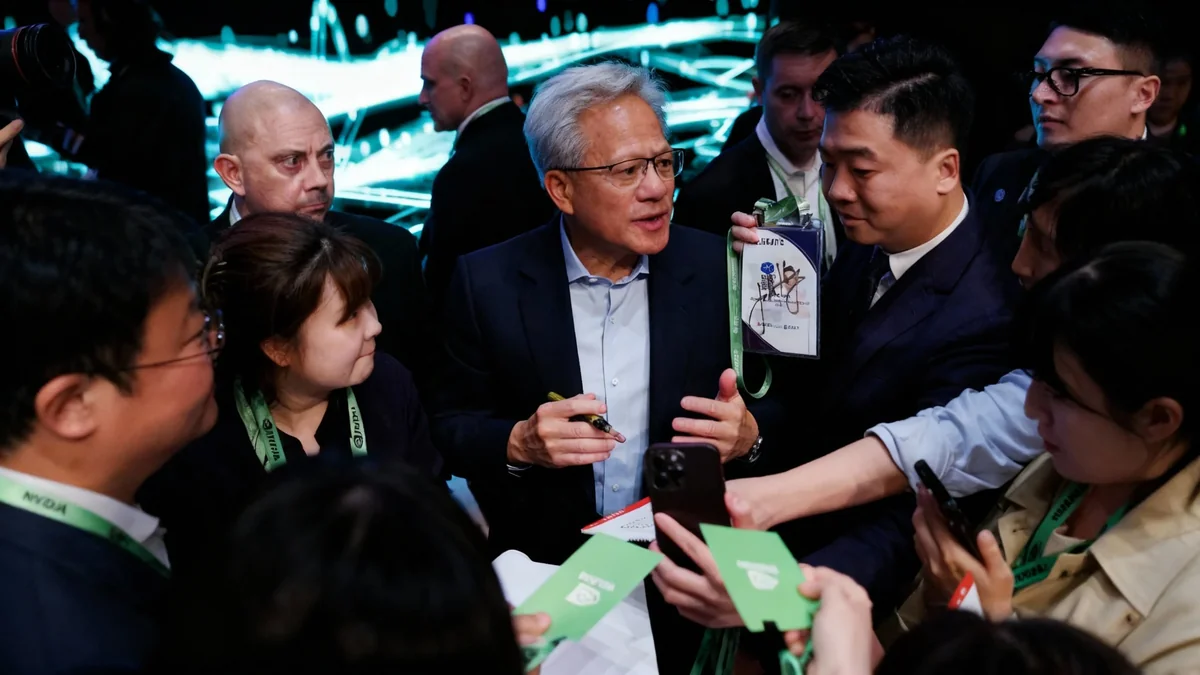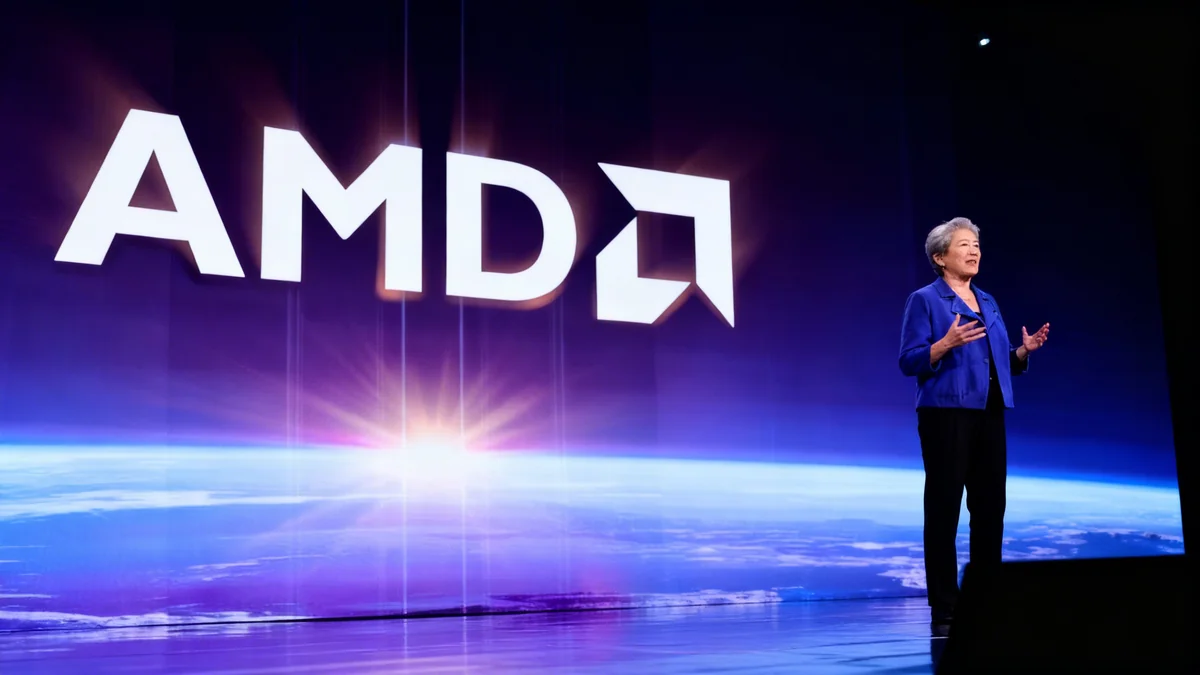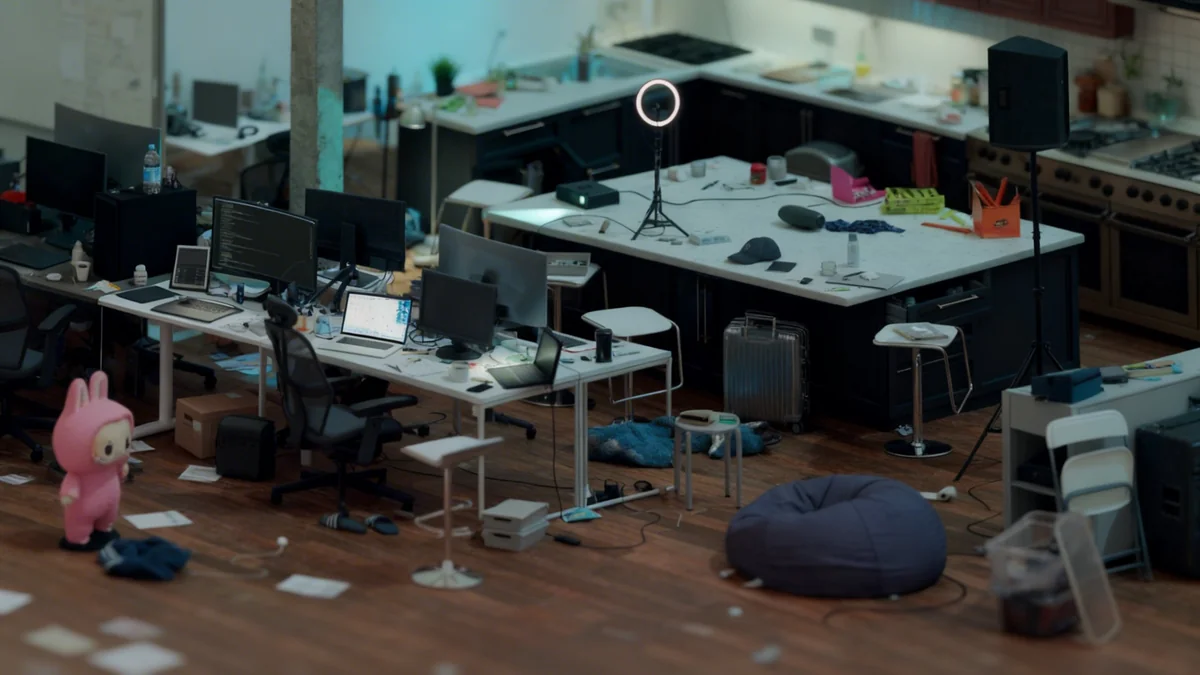Nvidia Corp. saw its market capitalization surge by nearly $400 billion in a single week, a move propelled by a series of strategic partnerships aimed at integrating its artificial intelligence technology across the global economy. CEO Jensen Huang spearheaded the effort, securing deals in sectors ranging from automotive to healthcare, signaling a deliberate strategy to expand beyond its core data center clients.
The flurry of announcements underscores the company's ambition to become a foundational technology provider for a new wave of industrial AI applications, even as some on Wall Street question the sustainability of the current AI investment boom.
Key Takeaways
- Nvidia's market value increased by almost $400 billion over five days, pushing the company closer to a $5 trillion valuation.
- CEO Jensen Huang announced major partnerships with companies like Uber, Nokia, and Eli Lilly to embed AI into diverse industries.
- The strategy aims to reduce reliance on large tech companies, which currently account for about half of Nvidia's revenue.
- New agreements in South Korea with Samsung and Hyundai, along with a commitment to US manufacturing, highlight a global expansion strategy aligned with current US economic policy.
A Strategic Expansion Beyond Data Centers
In a week of intense activity, Nvidia's leadership demonstrated a clear vision: to make its AI chips and software indispensable to nearly every major industry. This move is seen as a crucial step to diversify its revenue streams and solidify its market dominance.
The company's reliance on a handful of large technology firms, often referred to as hyperscalers, has been a point of concern for investors worried about a potential slowdown in spending. By forging new alliances, Nvidia is actively building a broader customer base.
During a developers conference in Washington, Huang detailed a series of collaborations. "We have now reached our virtuous cycle, our inflection point, and this is quite extraordinary," he stated, addressing thousands of developers. He emphasized that AI is poised to impact the entire $100 trillion global economy.
By The Numbers
The recent surge added over $9 billion to Jensen Huang's personal net worth, bringing his total to nearly $176 billion. The company's market cap gain in one week surpassed the total valuation of major corporations like Toyota Motor Corp.
Forging Alliances Across Industries
The partnerships announced span a wide spectrum of the economy, illustrating the breadth of Nvidia's ambitions. Each deal is designed to showcase a practical, monetizable application of AI technology.
Transportation and Autonomous Vehicles
In the automotive sector, Nvidia revealed plans to equip 100,000 Uber vehicles with its technology to support self-driving capabilities. A separate partnership was announced with automaker Lucid Group Inc. to advance autonomous driving systems. These moves position Nvidia as a key technology supplier for the future of transportation.
Telecommunications and Healthcare
A significant move into telecommunications was marked by a $1 billion equity investment in Finnish giant Nokia. This partnership aims to leverage AI to improve mobile network efficiency.
In healthcare, Nvidia is collaborating with pharmaceutical company Eli Lilly & Co. to build the most powerful supercomputer owned by a drugmaker. The goal is to accelerate drug discovery and development using AI-driven simulations and data analysis.
"Nvidia is putting their money where their mouth is. They were trying to give specific examples of AI in use, and the value they see that is being monetized."
Other notable collaborations include a cybersecurity initiative with CrowdStrike and a data integration project with Palantir Technologies Inc., further extending Nvidia's reach.
Global Deals and Political Strategy
Following the Washington conference, Huang traveled to South Korea to finalize more agreements. He announced plans to supply over 260,000 AI chips to major Korean conglomerates including Samsung Electronics, Hyundai Motor Group, and SK Group. These deals secure Nvidia's presence in one of the world's most technologically advanced manufacturing hubs.
Alignment with 'America First' Policy
Nvidia's recent moves appear closely aligned with the Trump administration's economic agenda. Huang has praised the administration's push for domestic investment and highlighted Nvidia's commitment to producing its advanced Blackwell chips at a new TSMC facility in Arizona. The company has reportedly increased its lobbying expenditures to approximately $3.5 million in the first nine months of this year.
Huang has committed to spending $500 billion over several years to build out AI infrastructure in the United States. "The first thing that President Trump asked me for is bring manufacturing back because it’s necessary for national security," Huang said. "Nine months later, we are now manufacturing in full production Blackwell in Arizona."
Navigating Headwinds and Market Skepticism
Despite the aggressive expansion and record-breaking market performance, Nvidia faces challenges. The company is still barred from selling its most advanced AI chips to China, a market Huang estimated could represent a $50 billion opportunity. Recent US-China trade discussions did not lift these restrictions, leaving a significant portion of the global market inaccessible.
This limitation has fueled concerns among some analysts who warn of a potential AI bubble. The core question is whether the massive capital investments in AI infrastructure will generate sufficient revenue to justify the expense. Jay Goldberg, a senior analyst at Seaport Global, is one of the few Wall Street analysts with a "sell" rating on the company's stock.
"No technology this big has been adopted in a straight line, and there are going to be growing pains," Goldberg noted. He suggested it could take several more years to fully understand the most valuable business models for AI.
However, through its recent deal-making, Nvidia is working to provide a clear answer, demonstrating tangible use cases and building a diverse ecosystem of partners betting on an AI-powered future.





